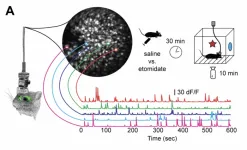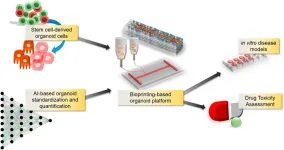(Press-News.org) New research by the University of Warwick has identified characteristics of aggressive driving – which impact both road users and the transition to self-driving cars of the future.
In the first study to systematically identify aggressive driving behaviours, scientists have measured the changes in driving that occur in an aggressive state. Aggressive drivers drive faster and with more mistakes than non-aggressive drivers – putting other road users at risk and posing a challenge to researchers working on self-driving car technology.
The research comes as a leading Detective Chief Superintendent, Andy Cox, warns of the perils of such driving – warning that the four-five deaths on UK roads daily are “predominantly caused by dangerous and reckless drivers”.
The study categorised aggressive driving behaviours and showed the key aspects of this dangerous driving style. Published in Accident Analysis and Prevention, it reported key findings:
Aggressive drivers have a 5km/h mean faster speed than non-aggressive drivers;
Aggressive drivers also exhibit more mistakes than control groups – such as not indicating when changing lanes;
Aggressive driving is categorised as any driving behaviour that intentionally endangers others psychologically, physically, or both.
Lead author of the study Zhizhuo Su, PhD student, at the Institutes of Digital Healthcare and Intelligent Vehicles, WMG at the University of Warwick, said: “While it’s unethical to let aggressive drivers loose on the roads, participants were asked to recall angry memories, putting them in an aggressive state, while performing a driving simulation. These were compared to a control group, who weren’t feeling aggressive.
“This research is significant because, as the era of autonomous vehicles approaches, road traffic will be a mix of both autonomous and non-autonomous vehicles, driven by people that may engaged in aggressive driving. This is the first study to characterise aggressive driving behaviour quantitatively in a systematic way, which may help the autonomous vehicles identify potential aggressive driving in the surrounding environment."
Roger Woodman, Assistant Professor at WMG and co-author of the study, added: “Over the last few decades, road safety policies, infrastructure changes, and improved vehicle safety have significantly reduced road casualties. However, human error, which is often a result of aggressive driving, remains a leading cause of crashes. To make driving safer, our research focuses on methods for understanding the state of the driver, to identify risky driving behaviours, through the use of driver monitoring systems (DMS). This will enable the driver to be alerted when they are at an increased risk of an accident and allow the vehicle to deploy calming methods, such as altering the cabin noise level, playing relaxing music, or ultimately reducing the speed of the vehicle.”
Dept Chief Superintendent Andy Cox, NPCC lead for fatal crash investigation and OCU Commander at the Metropolitan Police, added: ‘In the UK, on average between four-five people die every single day in a road crash. This widespread devastation is predominantly caused by dangerous and reckless drivers. Having met many bereaved families who live with the lifelong heartache of prematurely losing a loved one in such a violent manner, I recognise the need to instigate substantial change across the road safety sphere; which includes driving culture, standards and legislative options.
“Those drivers who choose to commit road crimes such as aggressive driving, intimidating other sensible and safe road users – should recognise the risk they pose to themselves and others, and frankly the law should remember that a driving licence is assigned after a person demonstrates themselves to be safe and earns the right to drive. We should seek to maintain high standards and ensure the system sees the right to drive as a privilege rather than an entitlement. Currently I think the balance favours the individual rather than the law abiding collective.”
Read the full paper here.
END
How road rage really affects your driving – and the self-driving cars of the future
New research by the University of Warwick has identified characteristics of aggressive driving – which impact both road users and the transition to self-driving cars of the future.
2023-04-11
ELSE PRESS RELEASES FROM THIS DATE:
Personalized blood pressure treatment more effective
2023-04-11
Patients treated with blood pressure-lowering drugs can experience much greater improvements from a change of medication than from doubling the dose of their current medication. This is shown by a new study from Uppsala University, published in the Journal of the American Medical Association (JAMA). In this study, 280 patients tested four different blood pressure-lowering drugs over the course of a year.
“The effect of a change of medication can be twice as great as the effect of doubling the dose of the patient’s current medication. It was clear in our study that certain patients achieved lower blood pressure from one drug than from another. This effect is ...
Nanoplasmonic imaging reveals real-time protein secretion
2023-04-11
Cell secretions like proteins, antibodies, and neurotransmitters play an essential role in immune response, metabolism, and communication between cells. Understanding cell secretions is key for developing disease treatments, but current methods are only able to report the quantity of secretions, without any detail as to when and where they are produced.
Now, researchers in the BIOnanophotonic Systems Laboratory (BIOS) in the School of Engineering and at the University of Geneva have developed a novel optical imaging ...
Mutant strains of Salmonella make infection more aggressive in commercial poultry, study shows
2023-04-11
In Brazil, a group of researchers supported by FAPESP created mutant forms of Salmonella to understand the mechanisms that favor colonization of the intestinal tract of chickens by these pathogenic bacteria and find better ways to combat the infection they cause.
An article on the study is published in the journal Scientific Reports. In it, the researchers note that, contrary to expectations, the mutant strains caused more severe infections than wild-type bacteria.
In the mutant strains, the genes ttrA and pduA were deleted. In previous research using mice, both genes had been shown to account for the ability of Salmonella to ...
Financial toxicity of cancer impacts partners’ quality of life
2023-04-11
ANN ARBOR, Michigan — A cancer diagnosis can cause financial strain on patients as they cope with the cost of treatment and lost work. But what about their partners?
A new study from University of Michigan Rogel Cancer Center researchers surveyed the partners of colorectal cancer patients and found the financial impact of a loved one’s diagnosis also impacts the partner’s health-related quality of life.
“We know that financial toxicity or hardship is a significant effect of cancer and its treatment ...
Danforth Center research uncovers how plants pass ‘memory’ of high CO2 to their offspring
2023-04-11
ST. LOUIS, MO, April 10, 2023 – New research lead by Keith Slotkin, PhD, member, Donald Danforth Plant Science Center opens the door for scientists to equip plants with the tools they need to adapt to rising levels of carbon dioxide (CO2), high heat, and other stressors associated with climate change. The newly published study in the journal The New Phytologist revealed
that the transgenerational inheritance occurred via DNA methylation, the process by which plants “mark” DNA without changing the code of the DNA itself ...
Icahn School of Medicine at Mount Sinai names new chair of microbiology
2023-04-11
Ana Fernandez-Sesma, PhD, has been appointed Chair of the Department of Microbiology at the Icahn School of Medicine at Mount Sinai. Dr. Fernandez-Sesma will direct all educational and research functions of the Department, while cultivating an academic culture that advances insights into virology, vaccinology, immunology, and microbiology, and encourages innovative approaches to teaching and mentoring.
Dr. Fernandez-Sesma has distinguished herself as an investigator focused on the mechanisms of immune evasion used by viruses, including dengue (DENV), ...
Conspiracy theories cause populism to rise
2023-04-11
Coinciding with the increased support for populist parties that we have witnessed all over the West, the last decade has also seen an increase in the number of populism-related studies, covering topics such as the causes and consequences of voting for parties that support these ideas, or the reasons for and possible consequences of the emergence and increasing presence of the attitudes on which they are based.
The links between conspiracy theories and populism have also aroused a great degree of interest. Carolina Galais, a researcher at the Universitat ...
Breast tomosynthesis improves screening in community settings
2023-04-11
OAK BROOK, Ill. – Researchers have found that digital breast tomosynthesis (DBT) has improved breast cancer screening performance in community practice and identifies more invasive cancers, compared to digital mammography. In addition, radiologists’ interpretive performance improved with DBT. The results of the study were published today in Radiology, a journal of the Radiological Society of North America (RSNA).
“Our study demonstrated that more radiologists in U.S. community practice are meeting recommended performance standards with digital breast tomosynthesis than ...
Key memory receptors are located on interneurons
2023-04-11
A key receptor regulating memory formation has been localized to interneurons, according to a study with implications for drug development. Robert Pearce and colleagues probed the localization of γ-aminobutyric acid type A receptors that incorporate α5 subunits (α5-GABAARs). α5-GABAARs are concentrated within the hippocampus, a brain structure that is essential for the formation of episodic memories. The general anesthetic etomidate blocks learning by targeting α5-GABAARs, as do many drugs designed to enhance cognition, intended for use in people with Alzheimer’s disease, ...
Bioprinting technology combined with artificial intelligence allows to obtain high quality in vitro models
2023-04-11
In the process of organoid manufacturing, bioprinting technology can not only facilitate the creation and maintenance of complex biological 3D shapes and structures, but also allow for standardization and quality control during production. And the addition of artificial intelligence, which can validate the product potential in the manufacturing process, allows to provide a more standardized source of cells for the organoid in terms of viability, function, etc. In other words, bioprinting combined with artificial intelligence is expected to perform real-time ...
LAST 30 PRESS RELEASES:
University of Oklahoma researchers develop durable hybrid materials for faster radiation detection
Medicaid disenrollment spikes at age 19, study finds
Turning agricultural waste into advanced materials: Review highlights how torrefaction could power a sustainable carbon future
New study warns emerging pollutants in livestock and aquaculture waste may threaten ecosystems and public health
Integrated rice–aquatic farming systems may hold the key to smarter nitrogen use and lower agricultural emissions
Hope for global banana farming in genetic discovery
Mirror image pheromones help beetles swipe right
Prenatal lead exposure related to worse cognitive function in adults
Research alert: Understanding substance use across the full spectrum of sexual identity
Pekingese, Shih Tzu and Staffordshire Bull Terrier among twelve dog breeds at risk of serious breathing condition
Selected dog breeds with most breathing trouble identified in new study
Interplay of class and gender may influence social judgments differently between cultures
Pollen counts can be predicted by machine learning models using meteorological data with more than 80% accuracy even a week ahead, for both grass and birch tree pollen, which could be key in effective
Rewriting our understanding of early hominin dispersal to Eurasia
Rising simultaneous wildfire risk compromises international firefighting efforts
Honey bee "dance floors" can be accurately located with a new method, mapping where in the hive forager bees perform waggle dances to signal the location of pollen and nectar for their nestmates
Exercise and nutritional drinks can reduce the need for care in dementia
Michelson Medical Research Foundation awards $750,000 to rising immunology leaders
SfN announces Early Career Policy Ambassadors Class of 2026
Spiritual practices strongly associated with reduced risk for hazardous alcohol and drug use
Novel vaccine protects against C. diff disease and recurrence
An “electrical” circadian clock balances growth between shoots and roots
Largest study of rare skin cancer in Mexican patients shows its more complex than previously thought
Colonists dredged away Sydney’s natural oyster reefs. Now science knows how best to restore them.
Joint and independent associations of gestational diabetes and depression with childhood obesity
Spirituality and harmful or hazardous alcohol and other drug use
New plastic material could solve energy storage challenge, researchers report
Mapping protein production in brain cells yields new insights for brain disease
Exposing a hidden anchor for HIV replication
Can Europe be climate-neutral by 2050? New monitor tracks the pace of the energy transition
[Press-News.org] How road rage really affects your driving – and the self-driving cars of the futureNew research by the University of Warwick has identified characteristics of aggressive driving – which impact both road users and the transition to self-driving cars of the future.




